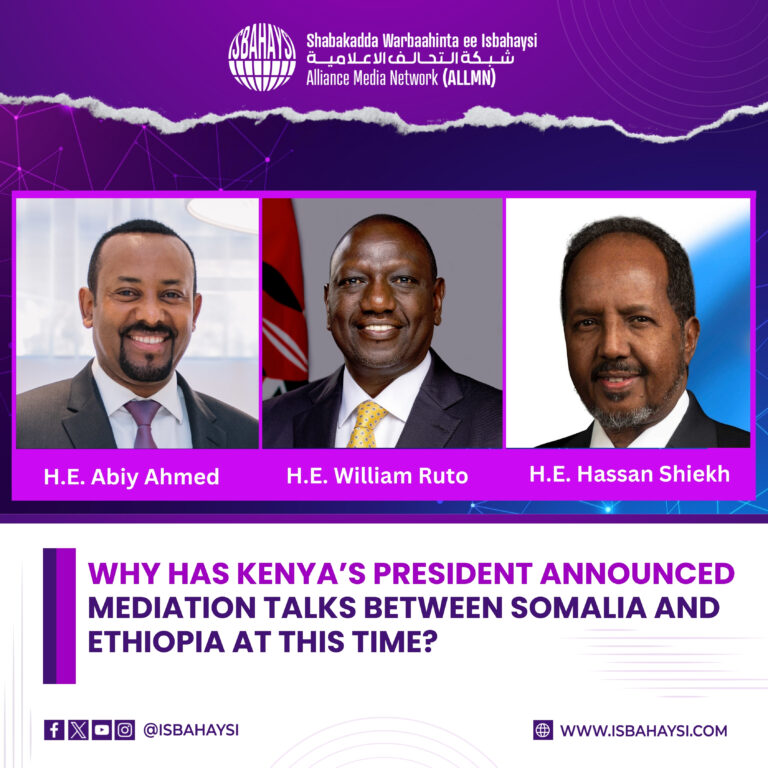
Following the recent visit of Somali President Hassan Sheikh Mohamud to Arusha, Tanzania, where he met Kenyan President William Ruto, it was revealed that President Hassan had agreed to engage in talks with Ethiopia.
According to President Ruto, Uganda and Kenya will mediate these discussions between Somalia and Ethiopia, with a conference planned soon, although the exact date and venue remain unspecified.
Since the beginning of this year, diplomatic relations between Somalia and Ethiopia have reached their lowest point. Ethiopia has shown ambitions to claim Somali territory and maritime areas, bypassing the Federal Government of Somalia (FGS) and making an unauthorized agreement with the Somaliland administration.
Earlier, Turkey, a close ally of both nations, attempted to mediate. However, despite several indirect negotiation rounds, no tangible results emerged. The FGS conditioned its participation in talks on Ethiopia first recognizing Somalia’s sovereignty and revoking the illegal agreements. Ethiopia rejected these conditions, insisting that both nations should meet to discuss their ongoing tensions and territorial claims.
President Hassan Sheikh has publicly labeled Ethiopia as Somalia’s primary adversary, asserting that negotiations would not occur unless Ethiopia rescinds its territorial claims and illegal agreements.
This recent shift by President Hassan Sheikh to reconsider his position can be attributed to emerging political developments, primarily influenced by four key factors:
- International Pressure
In recent months, intelligence officials from Western nations have visited the Horn of Africa, holding meetings with leaders from Somalia, Kenya, and Ethiopia. Notably, President Hassan met twice within a short period with the Director of the U.S. Central Intelligence Agency (CIA), reportedly to discuss resolving the tensions between Somalia and Ethiopia.
Political and security analysts suggest these visits were part of Western pressure to address the conflict. Western nations with vested interests in the Horn of Africa are concerned that tensions between Somalia and Ethiopia could provide opportunities for extremist groups to thrive.
2. Ethiopia’s Strategic Role in ATMIS Operations
Ethiopia is a critical player in the African Union Transition Mission in Somalia (ATMIS) and maintains additional troops outside the framework of ATMIS. Reports indicate that member states of ATMIS, which view Ethiopia as an indispensable security partner, are advocating for reconciliation between Somalia and Ethiopia to ensure Ethiopia’s involvement in the new African Union Security Support Operation in Somalia (AUSSOM).
This pressure has led to efforts to bring the two nations together, particularly as Ethiopia’s ATMIS deployment mandate nears its expiration later this month.
3. Shortage of Troops for AUSSOM Deployment
President Hassan Sheikh previously announced that Ethiopia would be excluded from the new AUSSOM mission due to its violations of Somalia’s sovereignty. Subsequently, he approached countries like Egypt and Eritrea during his visits, requesting troop contributions to fill the void left by Ethiopia.
However, as Isbahaysi sources indicate, these nations have been hesitant to deploy forces to Somalia. With the AUSSOM launch deadline approaching, this reluctance has forced President Hassan to reconsider his position on Ethiopia’s involvement, softening his earlier stance.
4. Tensions Between Jubbaland and the Federal Government
The emerging rift between the Federal Government of Somalia (FGS) and Jubbaland has further accelerated President Hassan’s shift in position. To prevent Ethiopia from aligning with Jubbaland’s President Ahmed Madobe, particularly in the contested Gedo region where Ethiopian forces maintain security control, the FGS has opted for dialogue. The new negotiations are expected to address Ethiopia’s role in the upcoming AUSSOM mission.
Conclusion
Ultimately, President Hassan Sheikh’s decision to approve negotiations with Ethiopia raises concerns about compromising Somalia’s sovereignty. Ethiopia has yet to retract its territorial ambitions and illegal agreements, making the move a contentious one.